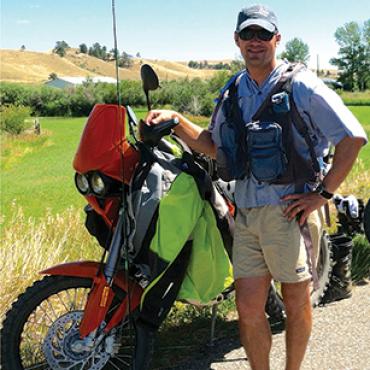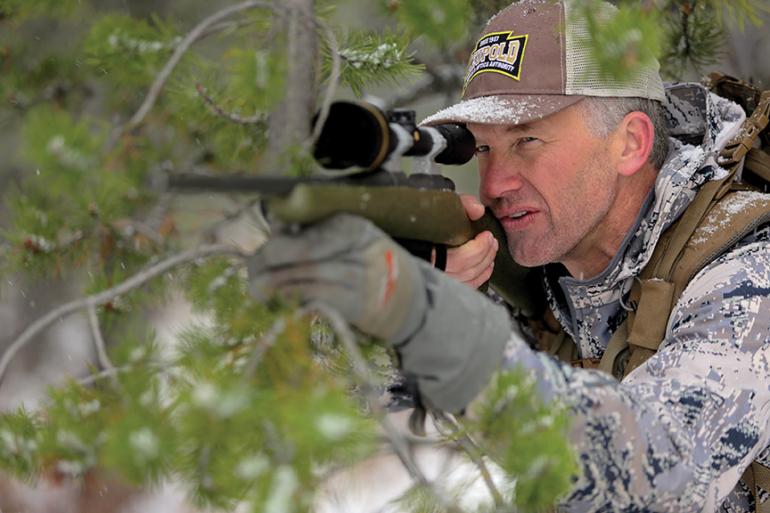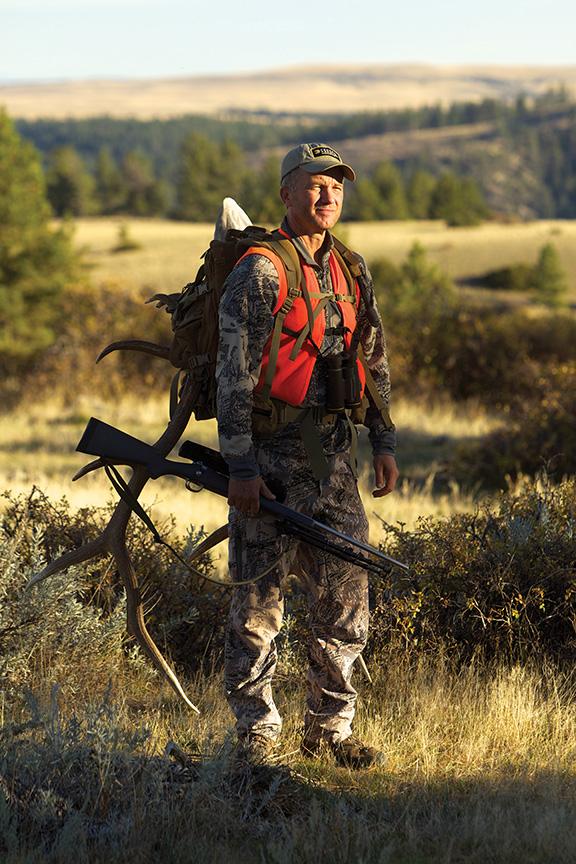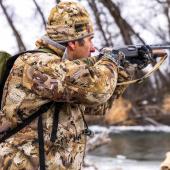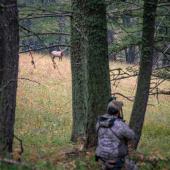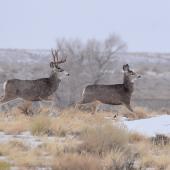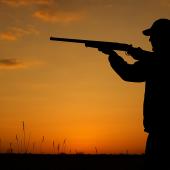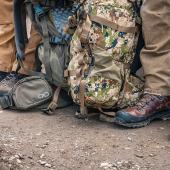Public Pursuit
An interview with Randy Newberg.
Bozeman-based Randy Newberg is a hunter, TV personality, and strong advocate of do-it-yourself hunts on public lands, something most O/B readers can relate to. In this interview, Randy answers some of the most salient questions concerning hunting, hunters, and public lands in Montana today.
Jimmy: It’s 2015. Why hunt?
Randy: Most succinctly, because I’m a hunter. Other reasons; food, conservation, fulfill my desires to continue my connection to the natural world. I come from a family of hunters. It’s who we are; it’s our identity, going back to my grandparents coming from Scandinavia at the turn of the last century. For me, hunting is a manner by which humans stay in tuned to the natural world in a sensory way you can’t find in any other activity. I don’t accept the premise that humans are spectators to the natural world. Rather, we have been participants since time began. To adopt the construct of recent societal pressures that somehow acquiring your own food is immoral, seems completely back assward to me. I reject that notion.
Jimmy: What’s the state of hunting in the U.S. today? Is hunting going to be around in the foreseeable future or is it in jeopardy?
Randy: The state of hunting in America is good. As people seek truth in the source of their food, hunting becomes one of the obvious conclusions. Hunters have a legacy of conservation extending much further than most understand. It was hunters who stopped the market exploitation. It was hunters who got the first game laws passed. It was hunters who taxed themselves, and still do today, for purposes of conservation. So long as hunting stays connected to food and conservation, hunting will always have a valuable place in society. When some use hunting for purposes beyond that, the image of hunting gets questioned by the non-hunting sector. Whether hunters like it or not, agree with me or not, hunting in today’s world exists only as long as society (mostly non-hunters) finds it to be relevant.
Jimmy: You are an advocate for hunting on public lands. Why? What makes hunting on public lands different from private land hunting?
Randy: If not for public lands, as a teenager, the oldest of three children being raised by a recently divorced waitress, I would have had no place to hunt. With no place to hunt, I would not have become a hunter; I wouldn’t be an advocate for wildlife, conservation, and large robust intact public landscapes. Public lands are a concept unique to North America. We should celebrate that those who came before realized the value of lands and fought to ensure that future generations would have public lands. Travel to other parts of the world and look at societies that have no public lands, examine their connection or disconnection to land health, and you will realize what a special thing we have in the United States.
As to hunting public lands versus private lands, I’ve done both. I really don’t make a distinction as to the reasons for either. All would agree that hunting public lands adds a significant level of challenge and determination, evidenced by the amount people are willing to pay for exclusive access to private lands. I can afford to hunt private lands, if I wanted. For me, hunting public lands keeps me connected to the story I explained at the beginning. My work is not about people like me having the resources to pay for exclusive access, rather making sure there are lands for others not in my position to have as Theodore Roosevelt called it, “the sturdy pleasure of the chase.”
Jimmy: Bozeman is a health-conscious community. We like our food to be produced locally and in a way that is natural and sustainable. For the Bozemanite who is on the fence about hunting but maintains these values, what might hunting offer?
Randy: I have a significant interest in my food, as do many in Bozeman. I was fortunate to grow up where naturally acquired food—that which we took via hunting and fishing; that which we picked from the forest; and that which came from gardens—was my main food source. For me, food from any other source seemed strange. For those with a similar background, this new “healthy food” movement seems a bit peculiar. As hunters, fishermen, gardeners, berry pickers, and others who use the natural world to acquire food in a sustainable manner, the health benefits of the food we acquire is almost taken for granted. To the rest of society now interested in their food source and food quality, many of the concerns they have are alleviated by food from hunting, fishing, and gardening. For me, when a non-hunter brings forth the topic of food quality, I almost have to ask, “If you are concerned about your food, why are you not acquiring your own?” I think the interest in food—in Bozeman a very keen interest—is a good thing. As people look at food, they realize that the quality of food and ability of the landscape to produce sustainable quantities of quality food is a function of landscape health. The next link in that chain is awareness of landscape health, resulting in conservation of these landscapes.
Jimmy: Lately there has been much talk about transferring nationally held public lands to state ownership. As a public lands hunter, I have experienced quality hunting on both federally and state-owned public lands. For example, in Montana I have had excellent hunting on national forest lands but also on state-owned school trust lands. In your opinion, where should a public lands hunter stand on this issue? Why?
Randy: Federal lands are held by all Americans; we are all beneficiaries of these lands. State Trust Lands are held in trust for the schools of each state. If you read the charter of many State Land Boards, they specifically state that lands held by State Land Boards are not public lands, rather lands held in trust for a distinct group of beneficiaries. That is a big difference. For example, in Colorado, State Trust Lands are not open to hunting, fishing, camping, hiking, or other public activities. Imagine if the 23 million acres of Federal Forest Service and BLM lands became State Trust Lands. That is 23 million acres of lands we currently enjoy, that would be off-limits. In New Mexico and Wyoming, you cannot camp on state lands. In our state of Montana, you have significant restrictions on camping and motorized use of state lands. Some will assume Montana State Trust Lands are of similar access and management priorities of Federal Lands. Not at all. State Trust Lands have one focus: raise money for schools. There is not mandate to manage or worry about other interests.
Many of your readers may be too young or too new to Montana to remember the knock-down, drag-out battle that occurred in the Legislature that allowed recreationists to pay an annual fee to access state lands. Prior to that fight, a fight where those of us involved still bear some scars, Montana was like Colorado; none of our state lands were open. If you look at the Montana legislature and you think it would be outside the realm of possibilities that they would change it back to the old rule where public access is denied to State Trust Lands, then you have a higher regard for that institution than I do.
At its core, this entire “transfer” movement is about getting the lands sold, a recycled ideology from the Sagebrush Rebellion of the late 1980s. Since they failed at convincing the federal government to sell these lands 30 years ago, the new effort is to transfer them to state agencies that are good at selling lands. Nevada has sold 99% of their State Trust Lands; Utah has sold over 40%, Wyoming has sold 700,000 acres. Alaska sells State Trust Lands to fund their universities and their mental health system. If these states acquired these Federal Lands as some are attempting, they would be selling lands all of us, you, me, and Outside Bozeman readers currently own. Make no mistake: that is what this idea is about. If it was truly about better land management, we all know what is needed to do that, yet Congress, especially those most vocal in support of state transfer kill any attempts to better manage the Federal lands. The management statement is the straw man argument that makes for a good sound bite when trying to convince people that state transfer is a better solution.
Jimmy: How do you see hunting access programs like Montana’s Block Management Program? These programs offer public hunting opportunities but on private lands. Are these beneficial programs worth supporting with tax dollars and license sales?
Randy: These are good. Montana started it and other states copied it. I have hunted similar programs in Wyoming, Idaho, and Kansas. I would say that for big game hunters, those states have taken what Montana started and brought it to a much higher level. Block Management in Montana is supported by user fees that come from hunting license sales. If that is what hunters feel is a good use of their money, then that is what agencies should do. All access programs can always be tweaked. Yet, when you realize access is the top reason for people hunting less or not hunting at all, you have to support the notion that creative access programs are a necessary tool, especially in states like Montana where two-thirds of our land is private.
Jimmy: What about CRP? As a bird hunter, I have seen a drastic decline in CRP acreage in the north-central part of Montana. On one hand, I am happy for the farmers; on the other, I am saddened to see the severe loss of habitat that has occurred in that area. What is your take on this situation? Is there anything that can be done to improve it?
Randy: CRP has done some amazing things for water quality, soil conservation, and the wildlife that depends on lands that have those attributes. With the fiscal condition of our government and a Congress that refuses to tackle the bigger fiscal challenges, programs like CRP become easy targets, even though they’re not even a drop in the ocean when compared to the bigger fiscal picture Congress faces.
Our support for conservation programs and our willingness to compensate landowners for providing conservation on their private lands is an expression of our collective conservation ethic. To see these programs decline, rather than sustain or increase is disappointing. Disappointing as to the direction our conservation ideas are headed in this country, but also disappointing when one removes incentives for private land owners to do what is best for the land and the “other occupants” dependent upon quality land. To improve it will take Americans deciding what is important in our priorities. Maybe it will take another huge loss of soil and water quality for Americans to see what values CRP and similar programs provided. Until then, I fear we are too ingrained in the rants of talking political heads to realize our most valuable assets, land and water, are suffering as a consequence.
Jimmy: Your hunting adventures have taken you all over the country. How do public lands differ throughout the nation? Say, in Alaska, as opposed to Arizona, Montana, or even New York or Maine?
Randy: They do differ greatly. I can say that no place has done the remarkable job of conserving large landscapes while accommodating a way of life, as has Montana. I’ve hunted and fished the grandest public landscapes we have. I could live anywhere in the west. I choose Montana for a reason. That said, the perception of how public lands are to be used varies greatly by state. Some, it is merely a reflection of the population pressures and the history of how they got to the current state of development. In other states, public lands have a very utilitarian expectation, providing a lot of subsistence harvest for locals. Eastern public lands are heavily used, which is good, but in some instances, are used beyond what the lands can support. In some areas, the changes in climate are having dramatic impacts, affecting people who have built lives around these public lands. As that happens, the connection to these lands gets weaker and advocacy for their health decreases.
I would suggest that every Montanan travel to a different state and use the public lands. You will gain a new appreciation for the way Montana has evolved with public lands being such a critical part of our lives. And as such, how we as a state have come to value them and work to conserve them while hopefully keeping local connections strong.
Jimmy: Is there any place for private-access-only hunting? Can any good come from such hunting lands?
Randy: I am sure there is. In some states, there is hardly any public land, so there exists no other alternative. If hunting provides incentive for landowners to keep habitats productive, that is good for all who like wildlife. I look at many of the well-managed private properties in Montana. Those private lands serve as reservoirs of wildlife to those of us hunting the adjacent public lands. If those private landowners did not benefit from hunting access, would they manage in such a wildlife-friendly manner, and if not, would it impact the quality of the public land hunting? There certainly is some place for private-access-only hunting, even if it is not how I hunt.
Jimmy: A lot of people have frustrating experiences and very little success hunting public lands. What are some tips you could offer to these hunters to help them be successful on public lands?
Randy: Set your expectations. Know that like most things in life, you get out of it what you put into it. If you scout, research, and learn your animals, you can have great success on public lands. If you decide to go about it in a casual manner, you will have a nice hike, but probably a more crowded and less productive experience. As a general rule, public-land hunting requires more exertion. Animals are smart. They get away from people, which means away from motors, roads, and trails. To be consistently successful on public lands, get a good pack, good boots, and know what your quarry does at the time of the year you are chasing them. I know that sounds oversimplified, but hunters have a habit of overcomplicating things.
Jimmy: You have a website, a blog, a YouTube channel, even a podcast. You are obviously very tech-savvy. Today people have drones at their disposal, technologically sophisticated weaponry with ever-increasing effective ranges, along with GPS and iPhone apps. In this 21st century hunting environment, what should the ethic be?
Randy: Every generation proclaims that the new technology advances of their time are the downfall of hunting. All of these represent both challenges and opportunities. Hunting will always run the risk of losing that fine balance between technology for the sake of making it easier and technology that allows for hunters to improve the likelihood of a clean and quick kill. As a group, we have to assess what impact our technology has on our lethality. Can the resource be sustainable when we employ technology to high degrees? Ask ten hunters and you will get 50 answers.
For me, hunting is a personal activity that is enhanced by getting closer. As such, I am not interested in technology that allows me to get further. Just my motives for why I hunt and what equipment I prefer to use.
Jimmy: Recently, there has been a trend in long-range shooting applied to hunting. (I'm talking the “Thousand Yard Club” here.) Frankly, as a guy who likes to get within less than 400 yards and regularly kills elk at ranges under 100 yards, the thought of people shooting at 1,000 yards angers me at best and scares the hell out of me at worst. My own thinking is that if these people want to shoot something at 1,000 yards they should set up a target, preferably on private land. This activity strikes me as shooting rather than hunting. Am I out of line here?
Randy: That is a struggle hunters have to sort out. Some will say it only offends those who can’t perform at such ranges. BS on that. None will argue that distance increases the influence variables of wind, temperature, ballistics, and human error have on the outcome. If someone disagrees with that, they are not smart enough to even have a discussion. Knowing distance amplifies those variables, it seems that we should still strive to get as close as possible, knowing the increased technology improves the likelihood of fast kill. Rather, it seems hunters have accepted some base level of “that’s a good enough likelihood of a clean kill” that allows them to shoot at longer distances, even though they know the distance impacts the probability of a messy outcome
I’ve had many discussions about it. My motives for hunting don’t allow my mind to follow the logic, but I’m not going to invest time debating what essentially boils down to another person’s comfort with the intersection point of distance and likelihood of wounding versus a clean kill. Distance is the one factor that is non-negotiable in that discussion. It is a function of physics. To not get as close as possible, not matter your technology or proficiency, is outside the logic my mind uses in assessing my relationship with animals I hunt.
Jimmy: Any final thoughts?
Randy: Montana is a better place than most realize. We have it good; actually, we have it great in Montana. I hope all will work to keep it that way and make it better for the next hunters who stalk elk in the Madison Range, who will flush sharptails on the Hi-Line, or pick berries in the Yaak. These public lands are your lands. Keep it that way.

